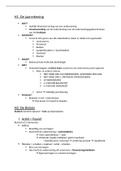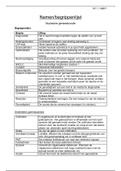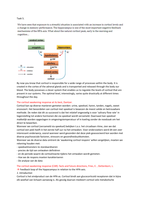Murder/Manslaughter & Loss of Control
Lecture 5
Actus reus
Mens rea
Strict liability
Standard defense of murder
Definition of murder:
‘Unlawfully killing a reasonable person who is in being and under the Queen’s peace with
malice aforethought’ Coke,3 Ins 47.
Murder is when a man of sound memory, and of the age of discretion, unlawfully killed
within any country of the realm any reasonable create in rerum natura (nature of things;
in existence) under the King’s peace (this case Queen), with malice aforethought (at
time of conducting death, D’s intention is to kill or cause GBH. Does not have to be
premediated/preplanned), either expressed by the party or implied by law (so as the
party wounded, or hurt, die of the wound or hurt within a year and a day of the same)
No specific statute or particular case that outlines murder; instead it comes from a legal scholar –
Edward Coke
Sentence:
Mandatory life; judge cannot pass a lesser sentence no matter how mitigating the circumstances
might be
o This doesn’t necessarily mean life; there’s a minimum tariff amount of years that you
MUST serve and based on the facts of the case, there will be added years onto that
Defences:
There are 3 partial defences to murder which reduce the conviction to voluntary manslaughter
which carries a maximum sentence of life and allows the judge’s discretion on sentencing.
These partial defences can be found in the Homicide Act 1957 and consist of diminished
responsibility, provocation (known as loss of control now) and suicide pact – not sure
if this is correct. I think there are only 2 defenses which apply.
Homicide offences:
When using the term homicide offences, it refers to a category that’s describes a group of
offences that share certain characteristics – other categories include, e.g. sexual offences;
property offences; etc. It does not refer to an offence with a distinct actus reus and mens rea.
It’s not correct to say D is labile for homicide. Instead, you say D is liable for a homicide
offence such as murder or manslaughter
Murder
Actus reus Mens rea
, Conduct element Any conduct that causes the result Voluntary
Circumstance element V must be a person; Knowledge
Under the Queen’s peace; Knowledge
Killing must be unlawful Lack of belief in lawfulness
Result element Death of V Intention to kill or cause GBH
Actus reus of murder is the:
1. unlawful killing: must be CAUSED by the accused = causation
o can be committed by an act or an omission:
1. R v Miller (1983) creating a dangerous situation and failing to put it
right,
2. R v Stone & Dobinson (1977) assumption of responsibility,
3. R v Dytham (1979) misconduct in public office, and
4. Fagan v MPC (1969) as part of a continuing act.
o all unlawful killings are result crimes and causation must also be established
o unlawful element excludes situations in which the defendant has an absolute
defence such as:
o self-defence,
o when death penalty was implemented,
o and soldiers/police may kill in the course of their duties but will be liable for
murder if they go beyond their duty or use excessive force.
Lecture 5
Actus reus
Mens rea
Strict liability
Standard defense of murder
Definition of murder:
‘Unlawfully killing a reasonable person who is in being and under the Queen’s peace with
malice aforethought’ Coke,3 Ins 47.
Murder is when a man of sound memory, and of the age of discretion, unlawfully killed
within any country of the realm any reasonable create in rerum natura (nature of things;
in existence) under the King’s peace (this case Queen), with malice aforethought (at
time of conducting death, D’s intention is to kill or cause GBH. Does not have to be
premediated/preplanned), either expressed by the party or implied by law (so as the
party wounded, or hurt, die of the wound or hurt within a year and a day of the same)
No specific statute or particular case that outlines murder; instead it comes from a legal scholar –
Edward Coke
Sentence:
Mandatory life; judge cannot pass a lesser sentence no matter how mitigating the circumstances
might be
o This doesn’t necessarily mean life; there’s a minimum tariff amount of years that you
MUST serve and based on the facts of the case, there will be added years onto that
Defences:
There are 3 partial defences to murder which reduce the conviction to voluntary manslaughter
which carries a maximum sentence of life and allows the judge’s discretion on sentencing.
These partial defences can be found in the Homicide Act 1957 and consist of diminished
responsibility, provocation (known as loss of control now) and suicide pact – not sure
if this is correct. I think there are only 2 defenses which apply.
Homicide offences:
When using the term homicide offences, it refers to a category that’s describes a group of
offences that share certain characteristics – other categories include, e.g. sexual offences;
property offences; etc. It does not refer to an offence with a distinct actus reus and mens rea.
It’s not correct to say D is labile for homicide. Instead, you say D is liable for a homicide
offence such as murder or manslaughter
Murder
Actus reus Mens rea
, Conduct element Any conduct that causes the result Voluntary
Circumstance element V must be a person; Knowledge
Under the Queen’s peace; Knowledge
Killing must be unlawful Lack of belief in lawfulness
Result element Death of V Intention to kill or cause GBH
Actus reus of murder is the:
1. unlawful killing: must be CAUSED by the accused = causation
o can be committed by an act or an omission:
1. R v Miller (1983) creating a dangerous situation and failing to put it
right,
2. R v Stone & Dobinson (1977) assumption of responsibility,
3. R v Dytham (1979) misconduct in public office, and
4. Fagan v MPC (1969) as part of a continuing act.
o all unlawful killings are result crimes and causation must also be established
o unlawful element excludes situations in which the defendant has an absolute
defence such as:
o self-defence,
o when death penalty was implemented,
o and soldiers/police may kill in the course of their duties but will be liable for
murder if they go beyond their duty or use excessive force.










